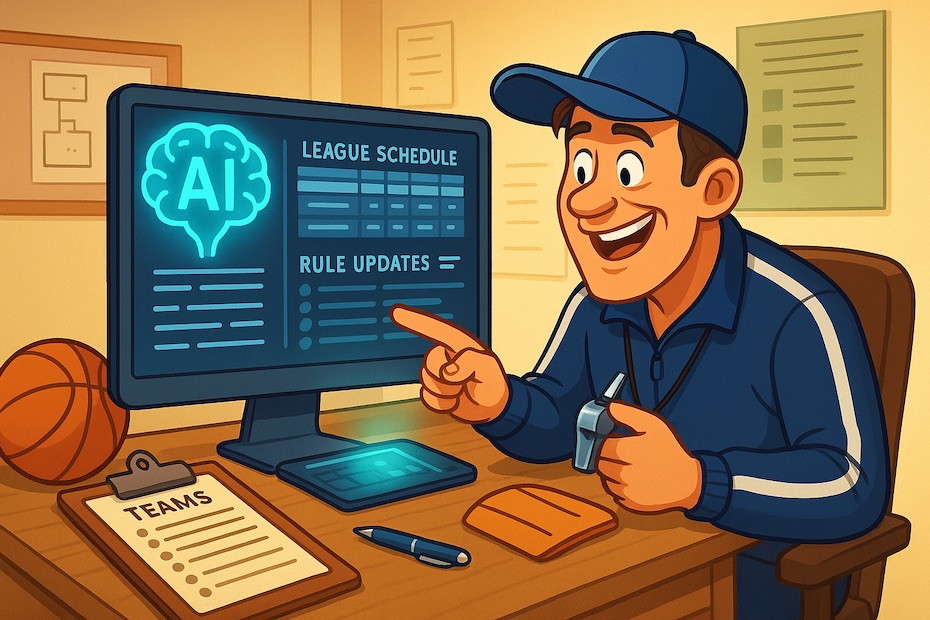You Love the Game, But You Hate the Chaos
You’ve been there. Saturday morning, whistle in hand, parents shouting from the sidelines, and you’re wondering if you accidentally signed up to manage a daycare instead of a soccer league. You’ve got players missing jerseys, parents missing forms, and rules that somehow change every other week. Congratulations—you’ve entered the thrilling world of amateur sports management.
For decades, this world has survived on equal parts passion, duct tape, and sheer denial. But now, AI has entered the field, and for once, it’s not here to replace humans—it’s here to stop them from losing their minds.
So grab your clipboard (or tablet, if you’re fancy). We’re about to explore how artificial intelligence is cleaning up the mess that’s been costing amateur sports time, money, and sanity for years.
The Beautiful Disaster Known as Amateur Sports
You’d think something as simple as running a kids’ league would be straightforward—teams, schedules, goals, done. But no. Amateur sports management is an Olympic sport of its own, complete with paperwork hurdles, logistical marathons, and referee tantrums worthy of a telenovela.
Every season starts the same: someone’s kid isn’t registered, a coach doesn’t show up, and half the parents are still arguing over the snack schedule. You’re left juggling spreadsheets, three different apps, and a rulebook thicker than “War and Peace.”
The real kicker? Everyone thinks they know the rules—until they don’t. One league’s “minor foul” is another’s “automatic suspension.” It’s like Monopoly: the rules change depending on who’s losing.
The Excel Era — Where Hope Goes to Die
Ah yes, the golden age of spreadsheets. This was the era where every coach, admin, and volunteer believed they could manage an entire league using Excel, Google Sheets, and blind optimism. You built formulas. You color-coded columns. You even made a “Master Schedule.”
And then, one wrong click later, the entire tournament bracket disappeared. Gone. Poof. Like your will to live on day three of registration week.
Meanwhile, volunteers are texting you at midnight asking if their kid’s team “definitely” plays on Saturday or “probably” does. The treasurer’s missing receipts. The ref’s calling in “confused.” And your rulebook still reads like it was translated through five languages and a blender.
Enter the Age of AI — The Hero Nobody Expected
You know things are bad when even the robots start feeling sorry for you. Enter AI—the digital assistant you didn’t know you needed but can’t live without once it shows up.
AI in amateur sports isn’t about replacing you. It’s about finally doing the boring stuff you hate. It sorts registration forms, reminds parents of deadlines, and even checks eligibility rules faster than you can say “wait, that’s not in the handbook.”
And here’s the best part: AI doesn’t get tired, emotional, or argue about the ref’s call. It just handles the chaos so you can focus on what actually matters—keeping the kids on the field and the parents off your back.
Rule Confusion — The Real Opponent on Game Day
Forget rival teams; your biggest enemy isn’t across the field—it’s in the rulebook. Amateur leagues run on a mix of outdated regulations, conflicting interpretations, and enough “grey area” to paint an entire stadium.
This is where AI earns its stripes. Tools like Ruley centralize every rule, regulation, and update so no one has to spend 20 minutes scrolling through an email thread titled “URGENT: rule clarification, again.” AI highlights changes, tracks compliance, and sends push notifications faster than a coach can say “Wait, that’s not how we did it last season.”
So the next time a coach protests a penalty or a parent quotes Facebook as a source, you can pull up Ruley, tap twice, and end the debate with data. It’s like having an assistant coach who’s part referee, part genius, and 100% drama-free.
Scheduling Chaos — AI vs. The Calendar Monster
If you’ve ever tried to schedule games across multiple teams, venues, and weather delays, you know this task makes solving a Rubik’s Cube blindfolded look easy. Every coach has “just one request,” every parent has “just one conflict,” and before long, your season calendar looks like a Jackson Pollock painting.
AI scheduling tools can now map conflicts, predict attendance trends, and even adjust for field availability automatically. They can balance travel time, daylight, and league priorities without breaking a sweat—or your sanity.
In one pilot study, AI scheduling cut planning time by 60%. That’s right—what used to take two weeks of frantic calls now takes an afternoon and a sandwich break.
The Money Pit — How AI Saves Your Budget
Here’s a dirty secret: amateur sports lose thousands each year to human error. Late fees, double bookings, refund confusion—small mistakes that add up faster than concession stand profits disappear.
AI systems track payments, predict cost overruns, and even flag potential fraud or duplicate entries. By handling the math, it prevents the awkward “we’re short again” meetings that every treasurer dreads.
In other words, AI is the league’s accountant, scheduler, and rule interpreter rolled into one—minus the coffee addiction and sarcasm (that’s your job).
The Future — Smart Leagues, Happier Humans
With AI managing logistics, amateur sports are starting to look… professional. Coaches get real-time insights, referees follow standardized calls, and parents get updates that make sense. Even athletes benefit from consistency—no more guessing if this week’s “new rule” applies or not.
Platforms like Ruley are shaping that shift by combining rule-tracking, scheduling, and compliance management into one brainy system that works across every level of play. For the first time, amateur sports can focus on playing, not panicking.
How AI Is Fixing Amateur Sports Chaos
- AI automates registration, scheduling, and rule management
- Platforms like Ruley reduce errors and confusion for leagues
- Coaches, players, and parents save time, money, and sanity
Conclusion: The Real Win Is Sanity
Let’s be honest—you didn’t get into sports to manage spreadsheets, chase signatures, or referee family feuds. You did it for the game, the teamwork, the joy.
AI isn’t replacing your passion—it’s rescuing it. It’s taking the chaos out of the league so you can get back to why you started in the first place.
So next season, when someone asks how you managed to pull off the smoothest season ever, just smile and say:
“Easy. I got a smarter assistant who doesn’t complain or eat all the orange slices.”

Cassandra Toroian is a sports-tech entrepreneur and CEO/co-founder of Ruley, the AI “e-referee” serving tennis, pickleball, padel, golf, and soccer. With 25+ years building companies—and a background in finance (MBA) plus Python training—she’s also co-founder of Volleybird and author of Don’t Buy the Bull. A former Division I tennis player, she’s focused on using AI to make sport fairer and more accessible.

